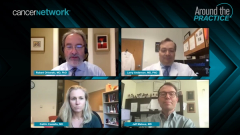
Managing A Case of Newly-Diagnosed Transplant-Ineligible MM
A panel of hematologist-oncologists comment on how they would treat a 74-year-old patient with newly diagnosed transplant-ineligible multiple myeloma.
Episodes in this series

Robert Orlowski, MD, PhD: In the next section, we’re going to talk about optimizing frontline therapy. We’ve talked about some of the options already, and here’s a patient case who we’ll use to further the discussion. This is a 74-year-old man with newly diagnosed myeloma who has ischemic heart disease, a couple of stents, and type 2 diabetes. He has a good performance status, and creatinines may be elevated. Our ISS [international staging system] is stage II. FISH [fluorescence in situ hybridization] has an 11;14 translocation. The symptomatic aspects are anemia and lytic bone lesions, and he’s deemed to be transplant ineligible by his treatment team.
Let’s go to the polling questions and see how people would treat this person. Would it be with VRD [bortezomib, lenalidomide, dexamethasone] at full doses? Would it be daratumumab-lenalidomide- dexamethasone? Would it be just lenalidomide-dexamethasone, CyBorD [cyclophosphamide, bortezomib, dexamethasone], daratumumab-VMP [bortezomib, melphalan, prednisone], VRd [bortezomib, lenalidomide, dexamethasone] lite, or KRd [carfilzomib, lenalidomide, dexamethasone]? While folks are voting, let me ask Larry and see what he would pick as a good regimen for this patient.
Larry Anderson, MD, PhD: There are a couple of issues. First, technically I don’t see anything on that list that makes them completely ineligible for transplant. That’s the first issue, but let’s just say they didn’t want a transplant. A monoclonal combo like daratumumab-lenalidomide-dexamethasone would be my typical choice for patients who are either not transplant candidates or don’t want to transplant because we have excellent deep remissions in most of these patients. It is very well tolerated and doesn’t cause neuropathy. That’s what I would do.
Robert Orlowski, MD, PhD: Caitlin, this gentleman had a t(11;14), but for the sake of argument let’s say he had a deletion 17P. Would you still go with daratumumab-lenalidomide-dexamethasone, or would you do a different regimen in that scenario?
Caitlin Costello, MD: Bob, there are many little teasers in this case that are taking it in different directions. The 11;14 immediately makes you think of venetoclax as a good option, but it’s not approved by the FDA. There are a lot of questions and concerns that came up with it. It’s a good drug but not on this list, so I’m saved there to not have to choose that 1. Remember this person also has type 2 diabetes. They didn’t give us any information about the A1C [glycated hemoglobin] to know how controlled it is or what degree of peripheral neuropathy they may have associated with it. Certainly, that’s something worth considering. A proteasome inhibitor is an excellent drug for high-risk cytogenetics, like a deletion 17P. It’s something that I do to have in my bag of tricks when I’m treating a high-risk patient.
That heart disease is just dangling that Kyprolis, or carfilzomib, in front of my face and tempting me to take the risk. For someone with underlying disease, we’re all nervous about the cardiotoxicity that comes with carfilzomib. We’re all becoming more comfortable with that. We have risk-mitigation strategies of trying to assess who would be a good candidate for carfilzomib and who we may otherwise have some concerns with. But if we monitor those patients closely, heart disease shouldn’t cross carfilzomib off the list. Should you push me hard, I want a proteasome inhibitor and someone with high-risk disease. Maybe someone who’s in good shape would be a good quad regimen [candidate] because then you can check all the boxes.
Robert Orlowski, MD, PhD: Speaking of quad regimens, Jeff, we do have D-VMP [daratumumab,bortezomib, melphalan, prednisone] as an option listed for this patient. We did have 1 person in the audience who selected that. What do you think of that regimen? We have nice phase 3 data, of course, from the ALCYONE study. What’s your thought?
Jeff Matous, MD: I don’t think I’ve used VMP [bortezomib, melphalan, prednisone] for quite a while, Bob. I’m trying to remember. We had a study with it when bortezomib first came out. It’s a great regimen. Alternatively, 1 could think about D-VTd [daratumumab, bortezomib, thalidomide, dexamethasone]. Although that was a transplant-eligible group, it’s something else out here if you’re comfortable with neuropathy. That’s a great quad. The data are phenomenal for the ALCYONE data. They’re excellent. It’s tricky to use that combo. If you’re not used to using it, it’s tricky. You must watch for cytopenias in the melphalan and so forth, but it’s a good regimen as well. There are a bunch of good choices for treating these patients. I’m just glad to see that everyone was going at least triplet to treat these people. I want to comment on carfilzomib because I get a little nervous too with cardiac disease with KRd [carfilzomib, lenalidomide, dexamethasone]. It’s a phenomenal regimen. Maybe you have cardiology and see if you can get away with giving carfilzomib as well.
Robert Orlowski, MD, PhD: I agree. You’d want to get a proteasome inhibitor in there for deletion 17P.
Transcript edited for clarity.
Newsletter
Stay up to date on recent advances in the multidisciplinary approach to cancer.










































